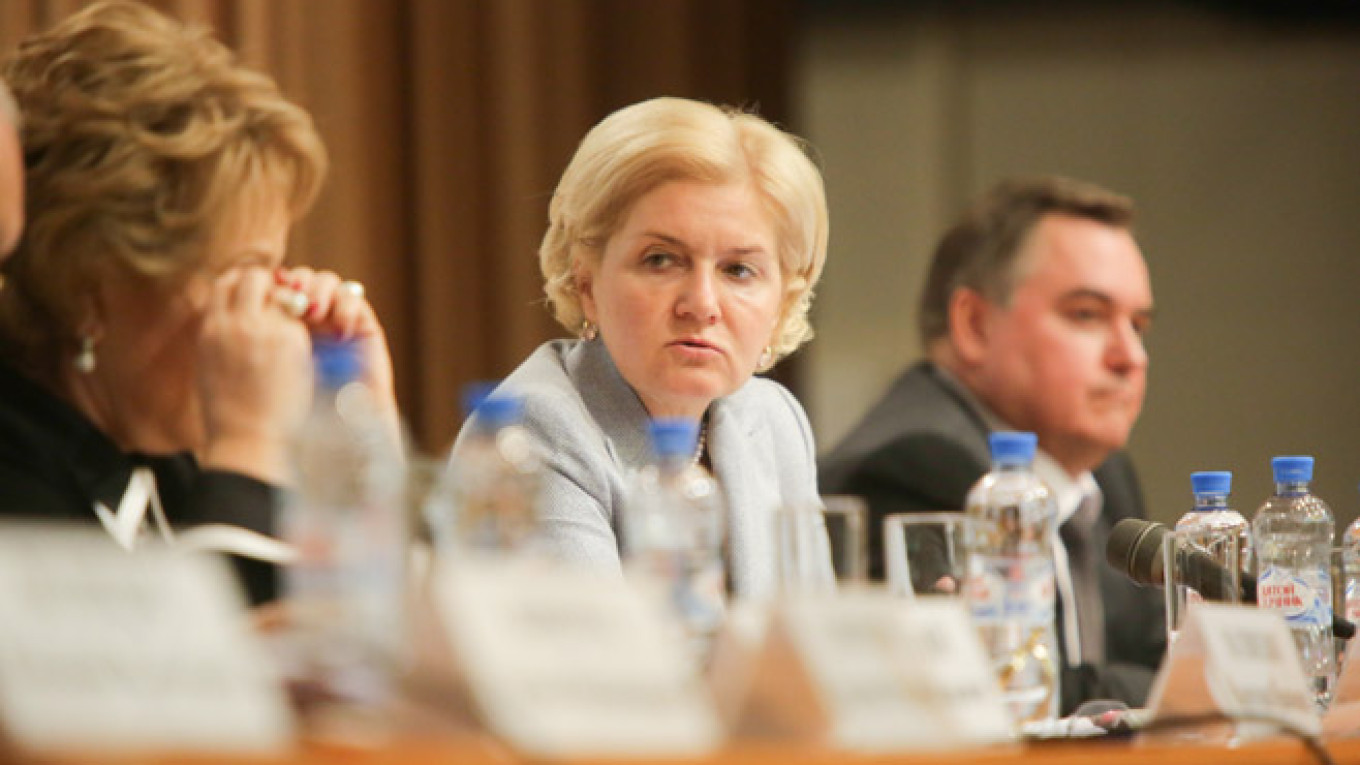The government has ramped up its isolationist drive with a senior official speaking out against sending sick children abroad for treatment, much to the dismay of charities and some parents.
"We were told we can only hope for a miracle — or send our child to Germany," Maxim Plyasunov, the father of a 16-month-old girl with heart failure, told The Moscow Times on Monday.
His daughter needs a Berlin Heart ventricular assist device that costs 5 million rubles ($143,000) to survive, said Plyasunov, a native of the impoverished Kirov region. He started an online donation drive after medical officials said it would take at least a month to review his child's case: time that she simply does not have.
He does not see eye to eye with Deputy Prime Minister Olga Golodets, who said Sunday that all too often, Russian children are unnecessarily sent for medical treatment abroad.
"Almost any kind of high-tech medical care can now be obtained domestically," Golodets was cited by Itar-Tass as saying.
Health authorities should monitor charities raising funds for treatment and state doctors endorsing such fundraisers, as well as educate them on local treatment options, the deputy prime minister told journalists.
Last Resort
Golodets' criticism prompted outcry in the Russian charity community, whose representatives said that while Russia does have high-quality doctors and facilities, there are not nearly enough of them.
Only a small proportion of children with serious illnesses are put forward for overseas treatment, and only after undergoing rigorous evaluation, said Yelena Volodina of the Dima's Dream foundation.
"Charities only send children abroad after [doctors] on the ground have been consulted and said that domestic treatment options have been exhausted," Volodina said by telephone.
Golodets did not provide statistics on how many children are needlessly given treatment outside the country or estimate the allegedly excessive expenditures.
Requests to the government and the Health Ministry were not answered before the newspaper went to print, and the Health Protection Committee of the State Duma did not return repeated calls for comment.
No data is available on the number of Russian children sent abroad for treatment. Outgoing medical tourism from Russia was estimated by the Expert weekly in 2013 at 100,000 a year.
No figures exist for the number of charities helping sick children in Russia, but charities involved in this line of work feature regularly in the media and on social networks, indicating that they are numerous and active. Dima's Dream, which is considered a modest operation, sent 163 children abroad from 2009 to 2013, Volodina said.
Glorious Isolation
The real motivation behind Golodets' attack on sending children abroad for treatment might have been political, charity activists said.
The minister appeared to be backing the general party line toward distrust of all things foreign, said Yekaterina Bermant of the charity Vse Vmeste, or "All Together."
The government has mounted an isolationist drive in recent years in the face of deteriorating relations with the West.
In 2012, the Kremlin stepped up administrative pressure on many NGOs receiving foreign funding and banned U.S. citizens from adopting Russian children. Last year, it prohibited state officials from owing foreign assets, though not real estate, and this April, advised against or outright banned foreign travel for up to 4 million state servants. A bill waiting for the president to sign it into law will make it obligatory to declare multiple citizenship, which critics say may be the first step toward banning having more than one passport.
Isolationists have already targeted healthcare: In February, the Health Ministry's top children's oncologist spoke out against treating Russian children outside the country, though he backtracked after a public backlash.
A Communist Party lawmaker last month proposed banning state officials from getting medical treatment abroad. The idea never materialized into a bill.
Whether or not any legal consequences follow the deputy prime minister's statement, doctors responsible for endorsing requests for overseas treatment may become more reluctant to do so for fear of getting on the wrong side of the medical authorities, charity activists said.
Isolationist legislation has reportedly already taken its toll on children: Of 33 orphans in St. Petersburg alone whose planned adoption by U.S. couples was cut short by the 2012 anti-adoption law, only one found a new foster family in Russia, Rosbalt.ru wrote last November.
Interestingly, Golodets — a former chief of mining giant Norilsk Nickel who owes real estate in Italy and Switzerland, according to her income declaration — unsuccessfully opposed the anti-adoption bill supported by President Vladimir Putin.
"I think she is just prodded from time to time into saying nasty things," Bermant said.
"But it is still nothing short of outrageous to meddle with treatment schemes that are still operating," she said.
See also:
Deputy Proposes Ban on Medical Treatment Abroad for Russian Officials
Contact the author at a.eremenko@imedia.ru
A Message from The Moscow Times:
Dear readers,
We are facing unprecedented challenges. Russia's Prosecutor General's Office has designated The Moscow Times as an "undesirable" organization, criminalizing our work and putting our staff at risk of prosecution. This follows our earlier unjust labeling as a "foreign agent."
These actions are direct attempts to silence independent journalism in Russia. The authorities claim our work "discredits the decisions of the Russian leadership." We see things differently: we strive to provide accurate, unbiased reporting on Russia.
We, the journalists of The Moscow Times, refuse to be silenced. But to continue our work, we need your help.
Your support, no matter how small, makes a world of difference. If you can, please support us monthly starting from just $2. It's quick to set up, and every contribution makes a significant impact.
By supporting The Moscow Times, you're defending open, independent journalism in the face of repression. Thank you for standing with us.
Remind me later.


